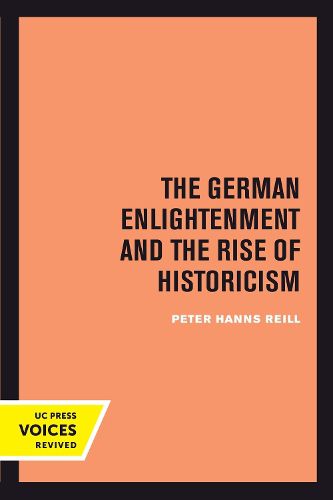Readings Newsletter
Become a Readings Member to make your shopping experience even easier.
Sign in or sign up for free!
You’re not far away from qualifying for FREE standard shipping within Australia
You’ve qualified for FREE standard shipping within Australia
The cart is loading…






The German Enlightenment and the Rise of Historicism traces the thought of a large and neglected group of German thinkers and their encounter with the ideas and ideal of the Enlightenment from 1740 to 1790. Concentrating on the nature of their historical consciousness, Peter Hanns Reill addresses two basic issues in the interpretation of the Enlightenment: to what degree can one speak of the unity of the Enlightenment and to what extent can the Enlightenment be characterized as modern ? Reill attempts to revise the traditional interpretation of the Enlightenment as an age insensitive to the postulates of modern historical thought and to dissolve the alleged opposition of the Enlightenment to later intellectual developments such as Idealism. He argues that German Enlightened thinkers generated the general presuppositions upon which modern historical thought is founded.
Asserting that the Enlightenment was not a unitary movement, Reill shows how each phase of it had unique elements and made contributions to Enlightenment thought as a whole. Exploring the forms of thought, the mental climate, and the different intellectual milieus in which the German thinkers operated, Reill demonstrates that they were confronted by two opposing intellectual traditions: German Pietism and rationalism. In attempting to reconcile both without submerging one into the other, these Enlightenment thinkers turned to historical speculation and learning. They discussed the relation between religious and rationalistic assumptions, the transformation of the concepts of religion and law, the interaction between aesthetic and historical thought, the creation of a theory of understanding to support the new idea of history, the use of causation in historical analysis, and the rediscovery of the Middle Ages. Reill reveals how they anticipated the work of more famous thinkers of the nineteenth century and establishes the conceptual similarities between thinkers generally thought to be more different than alike.
This title is part of UC Press’s Voices Revived program, which commemorates University of California Press’s mission to seek out and cultivate the brightest minds and give them voice, reach, and impact. Drawing on a backlist dating to 1893, Voices Revived makes high-quality, peer-reviewed scholarship accessible once again using print-on-demand technology. This title was originally published in 1975.
$9.00 standard shipping within Australia
FREE standard shipping within Australia for orders over $100.00
Express & International shipping calculated at checkout
The German Enlightenment and the Rise of Historicism traces the thought of a large and neglected group of German thinkers and their encounter with the ideas and ideal of the Enlightenment from 1740 to 1790. Concentrating on the nature of their historical consciousness, Peter Hanns Reill addresses two basic issues in the interpretation of the Enlightenment: to what degree can one speak of the unity of the Enlightenment and to what extent can the Enlightenment be characterized as modern ? Reill attempts to revise the traditional interpretation of the Enlightenment as an age insensitive to the postulates of modern historical thought and to dissolve the alleged opposition of the Enlightenment to later intellectual developments such as Idealism. He argues that German Enlightened thinkers generated the general presuppositions upon which modern historical thought is founded.
Asserting that the Enlightenment was not a unitary movement, Reill shows how each phase of it had unique elements and made contributions to Enlightenment thought as a whole. Exploring the forms of thought, the mental climate, and the different intellectual milieus in which the German thinkers operated, Reill demonstrates that they were confronted by two opposing intellectual traditions: German Pietism and rationalism. In attempting to reconcile both without submerging one into the other, these Enlightenment thinkers turned to historical speculation and learning. They discussed the relation between religious and rationalistic assumptions, the transformation of the concepts of religion and law, the interaction between aesthetic and historical thought, the creation of a theory of understanding to support the new idea of history, the use of causation in historical analysis, and the rediscovery of the Middle Ages. Reill reveals how they anticipated the work of more famous thinkers of the nineteenth century and establishes the conceptual similarities between thinkers generally thought to be more different than alike.
This title is part of UC Press’s Voices Revived program, which commemorates University of California Press’s mission to seek out and cultivate the brightest minds and give them voice, reach, and impact. Drawing on a backlist dating to 1893, Voices Revived makes high-quality, peer-reviewed scholarship accessible once again using print-on-demand technology. This title was originally published in 1975.